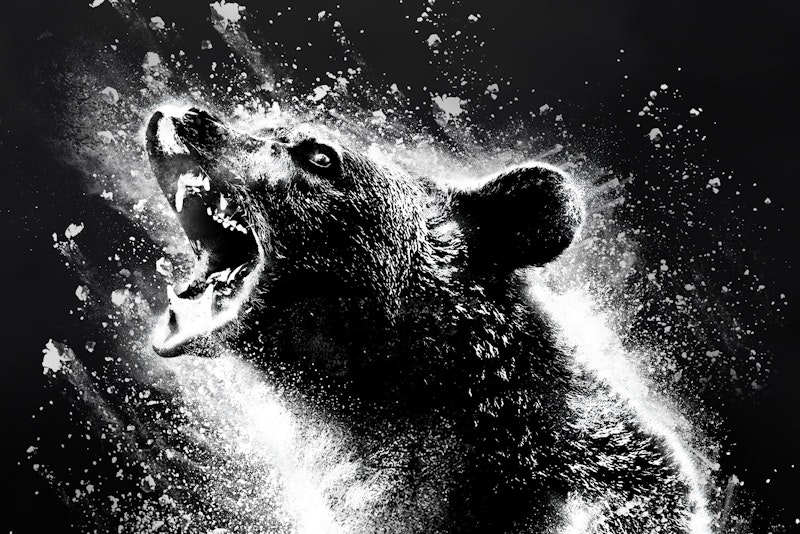More than a week ago, when my wife and son Nicky insisted the three of us pencil in Cocaine Bear—playing at the finally-renovated Harbor East Cinemas in downtown Baltimore—for a Saturday matinee, I initially exercised a veto, perhaps remembering how much I disliked The Revenant, but their enthusiasm wore me down. “It’s a movie about a bear. On cocaine. How can it go wrong?” one of them said, and as a good sport—the film was short and I was curious about the multiplex’s makeover, and also hadn’t been to that part of town since the pandemic; we last saw Greed, the awful Steve Coogan film, the final showing at the location before the lockdown here—I relented. Cocaine Bear is a pretty stupid movie, but since I had no expectations I liked it more than my two disappointed family members, who admitted they hyped it up too much in their minds.
It wasn’t surprising on Monday morning to see that Cocaine Bear was #2 in weekend box office receipts—approximately $23 million—because the title’s a grabber (“a poster movie,” Nicky wrote yesterday). (I was unaware that Cocaine Bear had a Super Bowl advertisement, and ignored all the social media whoopee and trailers.) “Cocaine Bear”: today it’s like a headline on a newspaper story that’s purposely composed for “clickbait,” and it worked.
I hadn’t thought about it before last weekend, but there aren’t many movies that have “gotcha” titles; although there’s not necessarily any correlation to how much money the production hauls in. I can think of a handful of very click-baity titles, most of which were released before that term became common parlance. Cool Hand Luke, for example, as well as Catch Me If You Can, Margin Call, The Last Picture Show, The Wolf Of Wall Street, Reality Bites and Risky Business.
The plot of Cocaine Bear, such as it is, is no secret: loosely based on a true story from 1985, a (really bad CGI) bear gets her paws on packages of coke that were chucked out of a plane into a national forest in Georgia, meant to be collected by bigtime dealer Syd—a phoned-in performance by the late Ray Liotta—and a few minutes in the viewer sees a hiker get mauled, with no restraint by director Elizabeth Banks in showing body parts. One by one, various unfortunates are dismembered by that “wild and crazy” bear, although two children are spared. (Audiences wouldn’t condone the depiction of a 13-year-old’s legs, hands and heart shown on screen.) And that’s it.
At 95 minutes, I was drawn in enough that I didn’t, as expected, retreat to a back row and occupy myself with tweets about the Red Sox. I did like Margo Martindale’s turn as a park ranger: I’ve no idea if Martindale is underrated or not, but she’s a great actress, from The Americans (reuniting with that show’s lesser Keri Russell in Cocaine Bear) to Sneaky Pete (the TV series starring Giovanni Ribisi, who’s definitely underrated) and her role as Bryan Cranston’s mother-in-law in the compelling (more the second season than the first) Your Honor, where Cranston isn’t much, but Michael Stuhlbarg and Isiah Whitlock, Jr.—also in Cocaine Bear— are terrific in the New Orleans government corruption/mafia/drugs series. (Cranston, typecast from Breaking Bad, is the weak link as a disgraced judge in Your Honor.)
I enjoy reading New Yorker film critic Anthony Lane—and have since the 1990s—although I think he takes Cocaine Bear a bit too seriously (perhaps he felt duty-bound to produce a sufficient word count), and he’s a touch prudish when complaining about Henry, a young teen, swearing so much. But Lane gets off some good lines. He writes: “If Banks is treating us to an allegory or a political parable, wagging her finger at our ecological sins, I must have missed it... It’s as if Quentin Tarantino kicked off his career, in the early nineteen-nineties, with a tale of some dogs who visit an actual reservoir.”
(An aside: while Lane’s still ticking on, when are “legacy” publications going to hand over the film critic reins to men and women under 35? Could be the feeling is their various demographics argue against it, but a few “fresh threats” might draw new readers to the stuffy publications.)
•••
As Andrew Ferguson—one of the great writers at the old Weekly Standard—points out with typical flair, the death watch over Jimmy Carter is unseemly and a lot of “blather.” Ferguson shows restraint in his comments about the 98-year-old now in hospice care (in all likelihood, when Henry Kissinger, now 99 and about three feet tall, won’t receive the same eulogies from D.C.’s cognoscenti), saying, perhaps out of charity, that Carter “wasn’t as terrible as many of us thought at the time” and as an ex-president hasn’t whored himself out to corporations for $500,000 canned speeches, as a few of his successors have. My in-laws in Los Angeles, years ago, worked with Carter on one of his Habitat for Humanity building projects, and were impressed with the man. That counts, although his thinly-veiled anti-Semitism still rankles me.
Here’s a what-if twist: suppose Carter, in 1976, had lost the presidential election by a whisker? Jerry Ford, the caretaker president, notable for nothing good in his short tenure as Nixon’s replacement, would’ve muddled through the rest of the 1970s, as Carter did, and likely retired to the golf course. Carter, the de facto Democratic leader, probably would’ve won the nomination again, squaring off against Ronald Reagan under different circumstances. It’s certainly possible Carter would be victorious in this hypothetical scenario, since the Democrats were the “out” party in the midst of a bad, bad recession and Reagan’s aggressive policy proposals would be for naught. Then again, Carter being Carter, micro-managing in a different decade, would’ve fallen to Reagan in 1984. Maybe this is idle hogwash, but it beats the “death watch” for a very old man who lived a long, eventful life.
—Follow Russ Smith on Twitter: @MUGGER1955

